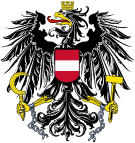
The Austrian People's Party is a conservative Christian-democratic political party in Austria. A successor to the Christian Social Party of the late 19th and early 20th centuries, it was founded immediately following the reestablishment of the Republic of Austria in 1945 and since then has been one of the two largest Austrian political parties with the Social Democratic Party of Austria (SPÖ). In federal governance, the ÖVP has spent most of the postwar era in a grand coalition with the SPÖ. Most recently, it has been junior partner in a coalition government with the SPÖ since 2007. However, the ÖVP won the 2017 election, having the greatest number of seats and formed a coalition with the far-right Freedom Party of Austria (FPÖ). Its chairman Sebastian Kurz is the youngest Chancellor in Austrian history.

Styria is a state, or Bundesland, located in the southeast of Austria. In area it is the second largest of the nine Austrian federated states, covering 16,401 km2 (6,332 sq mi). It borders Slovenia and the Austrian states of Upper Austria, Lower Austria, Salzburg, Burgenland, and Carinthia. The capital city is Graz which had 276,526 inhabitants at the beginning of 2015.
A dominant-party system, or one-party dominant system, is a system where there is "a category of parties/political organisations that have successively won election victories and whose future defeat cannot be envisaged or is unlikely for the foreseeable future." Many are de facto one-party systems, and often devolve into de jure one-party systems. Usually, the dominant party consistently holds majority government, without the need for coalitions.

Elections in Malaysia exist at two levels: federal level and state level. Federal level elections are those for membership in the Dewan Rakyat, the lower house of Parliament, while state level elections are for membership in the various State Legislative Assemblies. The heads of executive branch at both the federal and state levels, the Prime Minister and Menteri Besar/Chief Ministers respectively, are indirectly elected, usually filled by a member of the majority party/coalition in the respective legislatures.

Mitchell is a former electoral district of the House of Assembly in the state of South Australia. It was first created in the redistribution of 1969, taking effect at the 1970 election. Mitchell was replaced by Black at the 2018 election, resulting from the 2016 electoral redistribution.

The Australian Greens Victoria, commonly known as the Victorian Greens or just as The Greens, is the Victorian state member party of the Australian Greens, a green political party in Australia.

Colton is a single-member electoral district for the South Australian House of Assembly. It is a 26.2 km² suburban electorate on Adelaide's western beaches, taking in the suburbs of Adelaide Airport, Fulham, Fulham Gardens, Glenelg North, Henley Beach, Henley Beach South, Kidman Park, West Beach and part of Lockleys.

The thirteenth legislative assembly election, of Tamil Nadu was held on May 8, 2006. It was held for all 234 constituencies to elect the government in the state of for the following five years. The votes were counted three days later on May 11, 2006 and all the results were out by the end of the day. The Dravida Munnetra Kazhagam-led (DMK) front won the elections, with the DMK emerging as the single-largest party with 96 seats, and its leader, M Karunanidhi was sworn in as Chief Minister for a fifth and final term. This election marked the first time the state saw a hung assembly with no party gaining a majority of its own. As a result, DMK formed a minority government with its allies, which is the first in the state since the 1952 election. 13th Assembly was instituted due to this election.

The ninth Sarawak state election was held on Saturday, 20 May 2006 with nomination day on Tuesday, 9 May 2006. The election functioned to elect 71 representatives to the Sarawak State Assembly. The eighth state assembly was dissolved by Yang di-Pertua Negeri Sarawak, Tun Abang Muhammad Salahuddin Abang Barieng by the advice of Chief Minister Abdul Taib Mahmud, on 24 April 2006.

The Indian general election of 1967 elected the 4th Lok Sabha of India and was held from 17 to 21 February. The 27 Indian states and union territories were represented by 520 single-member constituencies.

The Lower Austrian state election of 2003 was held in the Austrian state of Lower Austria on 30 March 2003. The election saw the Austrian People's Party win a majority of the seats, while the Freedom Party of Austria only won about a quarter of the votes they had won in the 1998 election.

The All Mon Region Democracy Party is a political party in Myanmar, representing the interests of the Mon people. In the Myanmar general election, 2010, which was boycotted by both the main opposition National League for Democracy and the other main Mon party, the Mon National Party, the AMRDP won 16 total seats, 3 in the Pyithu Hluttaw, 4 in the Amyotha Hluttaw and 9 in regional hluttaws.

The Social Democratic Party of Austria is a social-democratic political party in Austria that is, along with the People's Party, one of the country's two traditional major parties.

The 2013 Sabah state election was held on Sunday, 5 May 2013 concurrently with the 13th Malaysian general election. 60 state seats were contested to elect state legislature in the Malaysian state of Sabah. This was the 12th state election in Sabah. The state legislative assembly was dissolved on 3 April 2013 following the announcement by Najib Razak to dissolve the federal Parliament earlier on the same day. Sabahans will also elect 25 representatives to the federal legislature which will be covered as part of the general election.

The Lower Austrian state election of 2013 was held in the Austrian state of Lower Austria on 3 March 2013. Since 2003 the Austrian People's Party has had a majority of the seats, the Team Stronach, which was standing for election in Lower Austria in the first time, won 5 seats, while the Social Democratic Party of Austria, like the Freedom Party of Austria, lost 2 seats and the Greens could defend their 4 seats.

Legislative elections were held in Austria on 15 October 2017. The Austrian People's Party (ÖVP) emerged as the largest party in the National Council, winning 62 of the 183 seats. The Social Democratic Party (SPÖ) finished second with 52 seats, slightly ahead of the Freedom Party of Austria (FPÖ), which received 51 seats. NEOS finished fourth with 10 seats, and PILZ entered parliament for the first time and came in fifth place with 8 seats. The Green Party failed to cross the 4% threshold and was ejected from parliament, losing all of its 24 seats.

The 2019 New South Wales state election was held on Saturday 23 March 2019 to elect the 57th Parliament of New South Wales, including all 93 seats in the Legislative Assembly and 21 of the 42 seats in the Legislative Council. The election was conducted by the New South Wales Electoral Commission (NSWEC).

The 2020 United States elections will be held on Tuesday, November 3, 2020. All 435 seats in the United States House of Representatives, 34 of the 100 seats in the United States Senate, and the office of President of the United States will be contested. Thirteen state and territorial governorships, as well as numerous other state and local elections, will also be contested.
The 14th Perlis State election was held on 9 May 2018. The previous state election was held on 5 May 2013. The state assemblymen is elected to 5 years term each.

The 14th Negeri Sembilan State election was held on 9 May 2018. The previous state election was held on 5 May 2013. The state assemblymen is elected to 5 years term each.



























